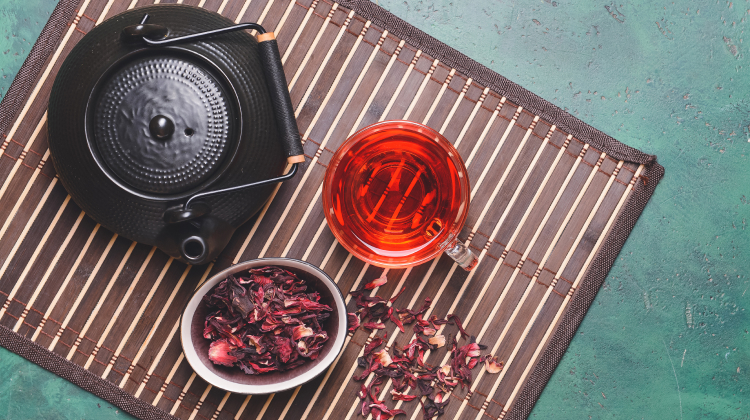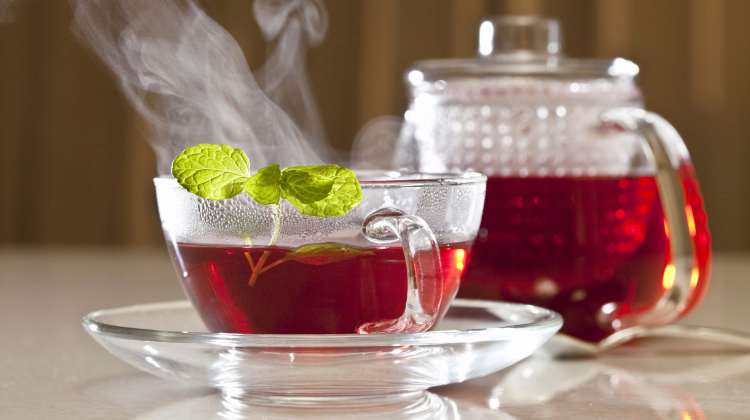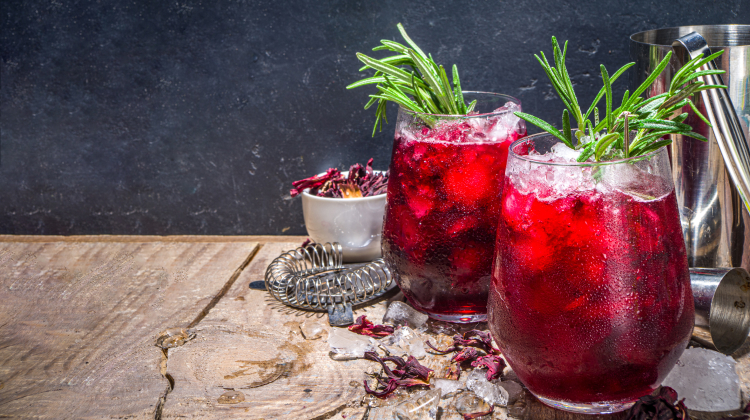Hibiscus Tea: Benefits, Downsides & How To Prepare 2024

Hibiscus tea is a sour-tasting herbal tea made from seeping the flowers from the hibiscus plant in hot water. Hibiscus tea has been used for centuries as a herbal remedy for various illnesses, but does the science back up the claims?
There is in fact scientific evidence for hibiscus tea benefits ranging from lowering blood pressure to aiding weight loss. Here are the top seven evidence-based health benefits of drinking hibiscus tea.
7 Amazing Health Benefits Of Hibiscus Tea
- May promote weight loss
- May lower cholesterol levels
- May lower blood sugar
- High in antioxidants
- May boost brain health
- Has antibacterial, antiviral, and antifungal properties
- May help lower high blood pressure
Health Benefits Of Drinking Hibiscus Tea
There are hundreds of varieties of hibiscus, but hibiscus tea is usually made with the variety Hibiscus sabdariffa, so we’ll be using this type of hibiscus throughout the article.
May Promote Weight Loss
There are lots of claims that drinking hibiscus tea can help promote weight loss, but is it really true?
Yes, certain compounds in Hibiscus sabdariffa flowers can actually inhibit weight gain and help you lose weight via a range of mechanisms.
One study found that taking a daily Hibiscus sabdariffa extract supplement led to significant weight loss in overweight people[1]. However, some of this could be the loss of water weight due to the diuretic effects of the extract.
Does hibiscus tea lead to real fat loss, or is it solely water weight loss?
Hibiscus contains lots of health-promoting bioactive compounds, including flavonoids, polyphenols, organic acids, and anthocyanins, which studies suggest contribute to healthy weight management[2].
One study in obese mice found that hibiscus inhibited fat accumulation[3], leading to significant fat loss after seven weeks.
Certain compounds in hibiscus can also inhibit intestinal α-glucosidase[4] and pancreatic α-amylase[5], enzymes that break down carbohydrates in the gut. This naturally blocks sugar and starch absorption[6], meaning you’ll absorb less of the calories from the carbohydrates in your food.
Another way hibiscus might work for promoting weight loss is by lowering cholesterol levels.
May Lower Cholesterol Levels
There are lots of studies suggesting anthocyanin-rich juices and extracts can help lower cholesterol levels[7], and hibiscus is no exception.
Compared to other teas, studies show that Hibiscus sabdariffa can significantly lower levels of low-density lipoproteins[8] (LDL-cholesterol), otherwise known as the “bad” cholesterol. The flavonoids in hibiscus can reduce oxysterol levels[9] – a derivative of cholesterol that impacts cholesterol metabolism – which may regulate cholesterol levels.
However, the cholesterol-lowering effects of Hibiscus sabdariffa may be due to the high vitamin C content[10] rather than the anthocyanins. A high dose of vitamin C can improve DNA integrity and may influence fat metabolism, leading to lower blood fat levels.
May Lower Blood Sugar
Hibiscus acts as a natural anti-diabetes remedy[4], with lower side effects compared to anti-diabetes drugs. Hibiscus tea, extract, and even juice may have blood sugar-lowering effects and can help restore insulin sensitivity[11].
As previously mentioned, hibiscus can reduce sugar absorption in the gut, which reduces blood sugar. But further studies suggest hibiscus also promotes glucose uptake by muscle cells[12], leading to further improved blood sugar balance.
And it doesn’t stop there. Hibiscus can also reduce blood sugar levels by acting in a similar way to a class of anti-diabetes drugs called gliptins[13], which improve the health of insulin-secreting beta cells and inhibit glucagon – a hormone that triggers the breakdown of glycogen into glucose in the blood.
High In Antioxidants
The health benefits of Hibiscus tea likely stem from its high antioxidant content. Hibiscus sabdariffa is high in several antioxidants, most notably anthocyanins and other phenolic acids.
Studies show that hibiscus consumption can increase glutathione levels[12], the body’s main antioxidant. It may also protect the liver against oxidative damage.
What’s more, hibiscus antioxidants may protect against certain types of cancers. Cell-based studies suggest hibiscus inhibits the growth of melanoma and breast cancer cells[14]. This seems to be due to anthocyanin’s apoptotic effects, triggering cell death.
Hibiscus Tea Benefits For Skin
The antioxidants in hibiscus tea may have benefits for skin health. Studies show that hibiscus acid might reverse skin aging by promoting higher levels of glutathione[15] in skin cells, which protects against oxidative damage.
Hibiscus Tea Benefits For Hair
Hibiscus antioxidants may be good for hair health, too. Studies suggest that hibiscus extract promoted faster hair growth[16] in rats.
Anthocyanins may also be used as a natural hair dye[17], which is better for hair health than synthetic hair dyes containing toxic compounds.
May Boost Brain Health
Studies suggest hibiscus can also improve brain health and memory.
Studies show that hibiscus lowers inflammation and oxidation levels in the brain, protecting brain cells from damage[18] and neurodegeneration due to neuroinflammation. These anti-inflammatory and antioxidant effects are likely down to anthocyanins and other antioxidant compounds.
Studies in mice show that hibiscus extract can even improve memory[19] by inhibiting the beta-amyloid plaque and tau protein accumulation associated with dementia.
Has Antibacterial, Antiviral, and Antifungal Properties
Studies show that hibiscus extracts have antibacterial, antiviral, and antifungal properties against a range of gram-positive and gram-negative bacterial strains[14], some viruses[20], and even fungi[21] and yeasts.
These effects are attributed to a synergistic effect of the polyphenols and organic acids.
May Help Lower High Blood Pressure
Hibiscus has been used as a folk remedy to reduce high blood pressure for centuries. In fact, new studies suggest that hibiscus extract lowers blood pressure as effectively as blood pressure-lowering medications[8].
Human studies show that hibiscus extract, providing 250 milligrams of anthocyanins per dose, can lower high blood pressure[22] as well as blood pressure-lowering medications.
Hibiscus inhibits the angiotensin-converting enzyme (ACE) enzyme and thus works in a similar way to a class of antihypertensive drugs called “ACE inhibitors.”
In addition to acting as a natural ACE inhibitor, hibiscus also lowers blood sodium levels, has vasodilatory, heart rate-lowering, and anti-inflammatory effects, which all contribute to lowering blood pressure and improving overall cardiovascular health[11].
Nevertheless, while hibiscus may have a blood pressure-lowering ability, it is not intended to replace prescription medications. Always consult with your doctor on the best blood pressure regimen for you.
Hot or iced hibiscus tea?
It turns out that making hot hibiscus tea is even better at lowering blood pressure[23] than a cold brew.
The hot water extracts more of the anthocyanins and other bioactive compounds, leading to better ACE-inhibiting effects compared to the cold extract.
Nutrition Information
8 fluid ounces of brewed hibiscus tea[24] provides
- 0 calories
- 0 grams of carbohydrates
- 0 grams of protein
- 0 grams of fat
- 19 milligrams of calcium
- 47 milligrams of potassium
Hibiscus Tea Side Effects
Estrogen Imbalance
Some types of hibiscus are rich in phytoestrogens, which can interfere with normal estrogen levels. Hibiscus sabdariffa is particularly high in the phytoestrogens quercetin and daidzein[25].
For example, consuming too much quercetin via herbal supplements over a long period of time might promote tumor development[26] in estrogen-dependent cancers such as breast cancer[27].
However, phytoestrogens can have both positive and negative effects depending on the context. For instance, hibiscus phytoestrogens were shown to improve memory in rats[28] with low estrogen levels. In another study, hibiscus phytoestrogens were actually shown to protect against some types of breast cancer[29].
Toxicity
Consuming too much hibiscus tea may have toxic effects.
Studies in rats suggest that hibiscus extract might have some toxic effects[30] when consumed regularly, such as the potential to cause kidney damage. However, more research on the long-term impact of hibiscus on kidney function.
Hibiscus tea also produces significant diuretic effects, which may be dangerous at high levels.
How To Make Hibiscus Tea?
Hibiscus tea is made by seeping hibiscus flower petals in water. You can make hibiscus tea hot or cold, but hot hibiscus tea is higher in antioxidants and has more health benefits.
Hibiscus flowers tend to make a very sour tea, so the recipes add sugar as an optional ingredient.
Here are two ways to make delicious hibiscus tea.
Hot Hibiscus Tea

Ingredients:
- ½ cup of hibiscus flowers (dried)
- 4 cups of water
- Sugar or sweetener to taste (optional)
Method:
- Boil the water.
- Place the dried hibiscus flowers in a teapot or thermal flask, and pour the boiling water over them.
- Leave to seep for 5 minutes. Strain out the leaves using a sieve (or leave them in if you don’t mind).
- If desired, add sugar or a sweetener of your choice, such as honey or agave. This is to balance out the sour flavor of the hibiscus. (If you don’t mind the sour taste, you can leave out the sugar.)
Cold Hibiscus Tea

Ingredients:
- ½ cup of hibiscus flowers (dried)
- 4 cups of water
- Honey or agave to taste (optional)
Method:
- Place the dried hibiscus flowers in a glass jug.
- Pour cold water over the flowers.
- Let it seep overnight, or for at least eight to twelve hours. (It takes a long time for the flavors to come out in cold water.)
- Strain out the hibiscus flowers and serve cold from the refrigerator or over ice to make iced tea.
- Add a liquid sweetener, such as honey or agave, to balance out the sour flavors if you wish.
Conclusion
Hibiscus tea is an herbal tea made from seeping hibiscus leaves in water. There are so many hibiscus tea benefits including promoting weight loss, lowering blood pressure, and balancing blood sugar.
Studies suggest that hibiscus may even work similarly to medications used to treat high blood pressure and diabetes. However, hibiscus is not meant to treat high blood pressure or be a replacement for prescription medications. Always consult your healthcare provider on the best blood pressure treatment for you.
Try drinking one cup of hot hibiscus tea per day as part of a healthy, balanced diet to get the health benefits.
+ 30 sources
Health Canal avoids using tertiary references. We have strict sourcing guidelines and rely on peer-reviewed studies, academic researches from medical associations and institutions. To ensure the accuracy of articles in Health Canal, you can read more about the editorial process here
- Herrera-Arellano, A., Miranda-Sánchez, J., Ávila-Castro, P., Herrera-Álvarez, S., Jiménez-Ferrer, J., Zamilpa, A., Román-Ramos, R., Ponce-Monter, H. and Tortoriello, J. (2006). Clinical Effects Produced by a Standardized Herbal Medicinal Product of Hibiscus sabdariffa on Patients with Hypertension. A Randomized, Double-blind, Lisinopril-Controlled Clinical Trial. Planta Medica, [online] 73(01), pp.6–12. doi:10.1055/s-2006-957065.
- Ojulari, O.V., Lee, S.G. and Nam, J.-O. (2019). Beneficial Effects of Natural Bioactive Compounds from Hibiscus sabdariffa L. on Obesity. Molecules, [online] 24(1), p.210. doi:10.3390/molecules24010210.
- Villalpando-Arteaga, E.V., Mendieta-Condado, E., Esquivel-Solís, H., Canales-Aguirre, A.A., Gálvez-Gastélum, F.J., Mateos-Díaz, J.C., Rodríguez-González, J.A. and Márquez-Aguirre, A.L. (2013). Hibiscus sabdariffa L. aqueous extract attenuates hepatic steatosis through down-regulation of PPAR-γ and SREBP-1c in diet-induced obese mice. Food & Function, [online] 4(4), p.618. doi:10.1039/c3fo30270a.
- Jamrozik, D., Borymska, W. and Kaczmarczyk-Żebrowska, I. (2022). Hibiscus sabdariffa in Diabetes Prevention and Treatment—Does It Work? An Evidence-Based Review. Foods, [online] 11(14), p.2134. doi:10.3390/foods11142134.
- HANSAWASDI, C., KAWABATA, J. and KASAI, T. (2000). α-Amylase Inhibitors from Roselle (Hibiscus sabdariffaLinn.) Tea. Bioscience, Biotechnology, and Biochemistry, [online] 64(5), pp.1041–1043. doi:10.1271/bbb.64.1041.
- Preuss, H.G., Echard, B., Bagchi, D. and Stohs, S. (2007). Inhibition by Natural Dietary Substances of Gastrointestinal Absorption of Starch and Sucrose in Rats and Pigs: 1. Acute Studies. International Journal of Medical Sciences, [online] pp.196–202. doi:10.7150/ijms.4.196.
- Zhao, Y., Xu, H., Tian, Z., Wang, X., Xu, L., Li, K., Gao, X., Fan, D., Ma, X., Ling, W. and Yang, Y. (2021). Dose-dependent reductions in plasma ceramides after anthocyanin supplementation are associated with improvements in plasma lipids and cholesterol efflux capacity in dyslipidemia: A randomized controlled trial. Clinical Nutrition, [online] 40(4), pp.1871–1878. doi:10.1016/j.clnu.2020.10.014.
- Ellis, L.R., Zulfiqar, S., Holmes, M., Marshall, L., Dye, L. and Boesch, C. (2022). A systematic review and meta-analysis of the effects of Hibiscus sabdariffa on blood pressure and cardiometabolic markers. Nutrition Reviews, [online] 80(6), pp.1723–1737. doi:10.1093/nutrit/nuab104.
- Crosignani, A., Zuin, M., Allocca, M. and Del Puppo, M. (2011). Oxysterols in bile acid metabolism. Clinica Chimica Acta, [online] 412(23-24), pp.2037–2045. doi:10.1016/j.cca.2011.07.028.
- Bakuradze, T., Tausend, A., Galan, J., Groh, I.A.M., Berry, D., Tur, J.A., Marko, D. and Richling, E. (2019). Antioxidative activity and health benefits of anthocyanin-rich fruit juice in healthy volunteers. Free Radical Research, [online] 53(sup1), pp.1045–1055. doi:10.1080/10715762.2019.1618851.
- Amos, A. and Khiatah, B. (2021). Mechanisms of Action of Nutritionally Rich Hibiscus sabdariffa’s Therapeutic Uses in Major Common Chronic Diseases: A Literature Review. Journal of the American Nutrition Association, [online] 41(1), pp.116–124. doi:10.1080/07315724.2020.1848662.
- Mohamed, A.I., Salau, V.F., Erukainure, O.L. and Islam, Md.S. (2022). Hibiscus sabdariffa L. polyphenolic‐rich extract promotes muscle glucose uptake and inhibits intestinal glucose absorption with concomitant amelioration of Fe 2+ ‐induced hepatic oxidative injury. Journal of Food Biochemistry. [online] doi:10.1111/jfbc.14399.
- Gupta, V. and Kalra, S. (2011). Choosing a Gliptin. Indian Journal of Endocrinology and Metabolism, [online] 15(4), p.298. doi:10.4103/2230-8210.85583.
- Montalvo-González, E., Villagrán, Z., González-Torres, S., Iñiguez-Muñoz, L., Isiordia-Espinoza, M., Ruvalcaba-Gómez, J., Arteaga-Garibay, R., Acosta, J., González-Silva, N. and Anaya-Esparza, L. (2022). Physiological Effects and Human Health Benefits of Hibiscus sabdariffa: A Review of Clinical Trials. Pharmaceuticals, [online] 15(4), p.464. doi:10.3390/ph15040464.
- Wang, D., Nagata, M., Matsumoto, M., Amen, Y., Wang, D. and Shimizu, K. (2022). Potential of Hibiscus sabdariffa L. and Hibiscus Acid to Reverse Skin Aging. Molecules, [online] 27(18), p.6076. doi:10.3390/molecules27186076.
- Adhirajan, N., Ravi Kumar, T., Shanmugasundaram, N. and Babu, M. (2003). In vivo and in vitro evaluation of hair growth potential of Hibiscus rosa-sinensis Linn. Journal of Ethnopharmacology, [online] 88(2-3), pp.235–239. doi:10.1016/s0378-8741(03)00231-9.
- Rose, P.M., Cantrill, V., Benohoud, M., Tidder, A., Rayner, C.M. and Blackburn, R.S. (2018). Application of Anthocyanins from Blackcurrant (Ribes nigrum L.) Fruit Waste as Renewable Hair Dyes. Journal of Agricultural and Food Chemistry, [online] 66(26), pp.6790–6798. doi:10.1021/acs.jafc.8b01044.
- Nogueira Silva Lima, M.T., Boulanger, E., Tessier, F.J. and Takahashi, J.A. (2022). Hibiscus, Rooibos, and Yerba Mate for Healthy Aging: A Review on the Attenuation of In Vitro and In Vivo Markers Related to Oxidative Stress, Glycoxidation, and Neurodegeneration. Foods, [online] 11(12), p.1676. doi:10.3390/foods11121676.
- El-Shiekh, R.A., Ashour, R.M., Abd El-Haleim, E.A., Ahmed, K.A. and Abdel-Sattar, E. (2020). Hibiscus sabdariffa L.: A potent natural neuroprotective agent for the prevention of streptozotocin-induced Alzheimer’s disease in mice. Biomedicine & Pharmacotherapy, [online] 128, p.110303. doi:10.1016/j.biopha.2020.110303.
- Joshi, S.S., Dice, L. and D’Souza, D.H. (2015). Aqueous Extracts of Hibiscus sabdariffa Calyces Decrease Hepatitis A Virus and Human Norovirus Surrogate Titers. Food and Environmental Virology, [online] 7(4), pp.366–373. doi:10.1007/s12560-015-9209-1.
- ST;Berchová, H. (2016). Antimicrobial, antiparasitic and anticancer properties of Hibiscus sabdariffa (L.) and its phytochemicals: in vitro and in vivo studies. Ceska a Slovenska farmacie : casopis Ceske farmaceuticke spolecnosti a Slovenske farmaceuticke spolecnosti, [online] 65(1). Available at: https://pubmed.ncbi.nlm.nih.gov/27118499/
- Herrera-Arellano, A., Miranda-Sánchez, J., Ávila-Castro, P., Herrera-Álvarez, S., Jiménez-Ferrer, J., Zamilpa, A., Román-Ramos, R., Ponce-Monter, H. and Tortoriello, J. (2006). Clinical Effects Produced by a Standardized Herbal Medicinal Product of Hibiscus sabdariffa on Patients with Hypertension. A Randomized, Double-blind, Lisinopril-Controlled Clinical Trial. Planta Medica, [online] 73(01), pp.6–12. doi:10.1055/s-2006-957065.
- Salem, M.A., Ezzat, S.M., Ahmed, K.A., Alseekh, S., Fernie, A.R. and Essam, R.M. (2022). A Comparative Study of the Antihypertensive and Cardioprotective Potentials of Hot and Cold Aqueous Extracts of Hibiscus sabdariffa L. in Relation to Their Metabolic Profiles. Frontiers in Pharmacology, [online] 13. doi:10.3389/fphar.2022.840478.
- Usda.gov. (2022). FoodData Central. [online] Available at: https://fdc.nal.usda.gov/fdc-app.html#/food-details/171946/nutrients
- Saeed, I.A., Ali, L., Jabeen, A., Khasawneh, M., Rizvi, T.A. and Ashraf, S.S. (2012). Estrogenic Activities of Ten Medicinal Herbs from the Middle East. Journal of Chromatographic Science, [online] 51(1), pp.33–39. doi:10.1093/chromsci/bms101.
- Andres, S., Pevny, S., Ziegenhagen, R., Bakhiya, N., Schäfer, B., Hirsch-Ernst, K.I. and Lampen, A. (2017). Safety Aspects of the Use of Quercetin as a Dietary Supplement. Molecular Nutrition & Food Research, [online] 62(1), p.1700447. doi:10.1002/mnfr.201700447.
- Singh, B., Mense, S.M., Bhat, N.K., Putty, S., Guthiel, W.A., Remotti, F. and Bhat, H.K. (2010). Dietary quercetin exacerbates the development of estrogen-induced breast tumors in female ACI rats. Toxicology and Applied Pharmacology, [online] 247(2), pp.83–90. doi:10.1016/j.taap.2010.06.011.
- Lorenzana-Martínez, G., Santerre, A., Andrade-González, I. and Bañuelos-Pineda, J. (2020). Effects of Hibiscus sabdariffa calyces on spatial memory and hippocampal expression of BDNF in ovariectomized rats. Nutritional Neuroscience, [online] 25(4), pp.670–680. doi:10.1080/1028415x.2020.1804095.
- Laskar, Y.B., Mazumder, P.B. and Talukdar, A.D. (2021). Hibiscus sabdariffa anthocyanins are potential modulators of estrogen receptor alpha activity with favourable toxicology: a computational analysis using molecular docking, ADME/Tox prediction, 2D/3D QSAR and molecular dynamics simulation. Journal of Biomolecular Structure and Dynamics, [online] pp.1–23. doi:10.1080/07391102.2021.2009914.
- Njinga, N.S., Kola-Mustapha, A.T., Quadri, A.L., Atolani, O., Ayanniyi, R.O., Buhari, M.O., Amusa, T.O., Ajani, E.O., Folaranmi, O.O., Bakare-Odunola, M.T., Kambizi, L., Oladiji, A.T. and Ebong, P. (2020). Toxicity assessment of sub-acute and sub-chronic oral administration and diuretic potential of aqueous extract of Hibiscus sabdariffa calyces. Heliyon, [online] 6(9), p.e04853. doi:10.1016/j.heliyon.2020.e04853.



